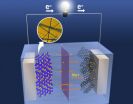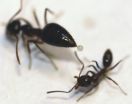(Press-News.org) RICHLAND, Wash. -- By adding the right amount of heat, researchers have developed a method that improves the electrical capacity and recharging lifetime of sodium ion rechargeable batteries, which could be a cheaper alternative for large-scale uses such as storing energy on the electrical grid.
To connect solar and wind energy sources to the electrical grid, grid managers require batteries that can store large amounts of energy created at the source. Lithium ion rechargeable batteries -- common in consumer electronics and electric vehicles -- perform well, but are too expensive for widespread use on the grid because many batteries will be needed, and they will likely need to be large. Sodium is the next best choice, but the sodium-sulfur batteries currently in use run at temperatures above 300 degrees Celsius, or three times the temperature of boiling water, making them less energy efficient and safe than batteries that run at ambient temperatures.
Battery developers want the best of both worlds -- to use both inexpensive sodium and use the type of electrodes found in lithium rechargeables. A team of scientists at the Department of Energy's Pacific Northwest National Laboratory and visiting researchers from Wuhan University in Wuhan, China used nanomaterials to make electrodes that can work with sodium, they reported June 3 online in the journal Advanced Materials.
"The sodium-ion battery works at room temperature and uses sodium ions, an ingredient in cooking salt. So it will be much cheaper and safer," said PNNL chemist Jun Liu, who co-led the study with Wuhan University chemist Yuliang Cao.
The electrodes in lithium rechargeables that interest researchers are made of manganese oxide. The atoms in this metal oxide form many holes and tunnels that lithium ions travel through when batteries are being charged or are in use. The free movement of lithium ions allows the battery to hold electricity or release it in a current. But simply replacing the lithium ions with sodium ions is problematic -- sodium ions are 70 percent bigger than lithium ions and don't fit in the crevices as well.
To find a way to make bigger holes in the manganese oxide, PNNL researchers went much much smaller. They turned to nanomaterials -- materials made on the nanometer-sized scale, or about a million times thinner than a dime -- that have surprising properties due to their smallness. For example, the short distances that sodium ions have to travel in nanowires might make the manganese oxide a better electrode in ways unrelated to the size of the tunnels..
To explore, the team mixed two different kinds of manganese oxide atomic building blocks -- one whose atoms arrange themselves in pyramids, and another one whose atoms form an octahedron, a diamond-like structure from two pyramids stuck together at their bases. They expected the final material to have large S-shaped tunnels and smaller five-sided tunnels through which the ions could flow.
After mixing, the team treated the materials with temperatures ranging from 450 to 900 degrees Celsius, then examined the materials and tested which treatment worked best. Using a scanning electron microscope, the team found that different temperatures created material of different quality. Treating the manganese oxide at 750 degrees Celsius created the best crystals: too low and the crystals appeared flakey, too high and the crystals turned into larger flat plates.
Zooming in even more using a transmission electron microscope at EMSL, DOE's Environmental Molecular Sciences Laboratory on PNNL's campus, the team saw that manganese oxide heated to 600 degrees had pockmarks in the nanowires that could impede the sodium ions, but the 750 degree-treated wires looked uniform and very crystalline.
But even the best-looking material is just window-dressing if it doesn't perform well. To find out if it lived up to its good looks, the PNNL-Wuhan team dipped the electrode material in electrolyte, the liquid containing sodium ions that will help the manganese oxide electrodes form a current. Then they charged and discharged the experimental battery cells repeatedly.
The team measured peak capacity at 128 milliAmp hours per gram of electrode material as the experimental battery cell discharged. This result surpassed earlier ones taken by other researchers, one of which achieved peak capacity of 80 milliAmp hours per gram for electrodes made from manganese oxide but with a different production method. The researchers think the lower capacity is due to sodium ions causing structural changes in that manganese oxide that do not occur or occur less frequently in the heat-treated nano-sized material.
In addition to high capacity, the material held up well to cycles of charging and discharging, as would occur in consumer use. Again, the material treated at 750 Celsius performed the best: after 100 cycles of charging-discharging, it lost only 7 percent of its capacity. Material treated at 600 Celsius or 900 Celsius lost about 37 percent and 25 percent, respectively.
Even after 1,000 cycles, the capacity of the 750 Celsius-treated electrodes only dropped about 23 percent. The researchers thought the material performed very well, retaining 77 percent of its initial capacity.
Last, the team charged the experimental cell at different speeds to determine how quickly it could take up electricity. The team found that the faster they charged it, the less electricity it could hold. This suggested to the team that the speed with which sodium ions could diffuse into the manganese oxide limited the battery cell's capacity -- when charged fast, the sodium ions couldn't enter the tunnels fast enough to fill them up.
To compensate for the slow sodium ions, the researchers suggest in the future they make even smaller nanowires to speed up charging and discharging. Grid batteries need fast charging so they can collect as much newly made energy coming from renewable sources as possible. And they need to discharge fast when demands shoots up as consumers turn on their air conditioners and television sets, and plug in their electric vehicles at home.
Such high performing batteries could take the heat off an already taxed electrical power grid.
INFORMATION:
Reference: Yuliang Cao, Lifen Xiao, Wei Wang, Daiwon Choi, Zimin Nie, Jianguo Yu, Laxmikant V. Saraf, Zhenguo Yang and Jun Liu, Reversible Sodium Ion Insertion in Single Crystalline Manganese Oxide Nanowires with Long Cycle Life, Advanced Materials, June 3, 2011, DOI 10.1002/adma.201100904 (http://dx.doi.org/10.1002/adma.201100904).
This work was funded by the Department of Energy's Office of Science and Office of Electricity Delivery & Energy Reliability.
EMSL, the Environmental Molecular Sciences Laboratory located at Pacific Northwest National Laboratory, is a national scientific user facility sponsored by the Department of Energy's Office of Science. EMSL offers an open, collaborative environment for scientific discovery to researchers around the world. EMSL's technical experts and suite of custom and advanced instruments are unmatched. Its integrated computational and experimental capabilities enable researchers to realize fundamental scientific insights and create new technologies. EMSL's Facebook page.
Pacific Northwest National Laboratory is a Department of Energy Office of Science national laboratory where interdisciplinary teams advance science and technology and deliver solutions to America's most intractable problems in energy, national security and the environment. PNNL employs 4,900 staff, has an annual budget of nearly $1.1 billion, and has been managed by Ohio-based Battelle since the lab's inception in 1965. Follow PNNL on Facebook, LinkedIn and Twitter.
The heat is on for sodium-manganese oxide rechargeable batteries
New method to make sodium ion-based battery cells could lead to better, cheaper batteries for the electrical grid
2011-06-08
ELSE PRESS RELEASES FROM THIS DATE:
Glaciations may have larger influence on biodiversity than current climate
2011-06-08
An investigation by the Spanish Scientifc Council (Consejo Superior de Investigaciones Científicas, CSIC) reveals that the large impacts occurred during the last ice age maintain their effects on the current distribution of dung beetles of the scarab family (Scarabaeidae). The presence of these beetles in Europe seems to be more influenced by the climate of that glaciation than by the present one.
The study, published yesterday in the journal Ecology Letters, analyzed the species richness and the structure of their communities throughout the different regions of the European ...
Your attention please: 'Rewarding' objects can't be ignored
2011-06-08
The world is a dazzling array of people, objects, sounds, smells and events: far too much for us to fully experience at any moment. So our attention may automatically be snagged by something startling, such as a slamming door, or we may deliberately focus on something that is important to us right then, such as locating our child among the happily screaming hordes on the school playground. We also know that people are hard-wired to seek out and pay attention to things that are rewarding, such as food when we are hungry, or water when we are thirsty.
So what happens ...
Chicago Plastic Surgeon Makes Appearance on Popular Show, The Doctors
2011-06-08
Dr. Kotis, a Chicago plastic surgeon, made an appearance on the popular daytime television show The Doctors. He and the show's host, Dr. Drew Ordon, scrubbed in to demonstrate a cutting-edge procedure that can end the pain and limitations caused by rheumatoid arthritis and osteoarthritis.
In the May 24th airing of The Doctors take on Chicago, Dr. Kotis performed a surgery to replace a thumb joint which has been worn down on a woman due to a terrible car accident. The damaged joint caused the bones in the thumb to rub together causing severe rheumatoid as well as osteoarthritis. ...
Brown and Crouppen Welcomes FDA Study
2011-06-08
Metal-on-Metal ("MoM") hip replacements have come under scrutiny lately. On May 6, 2011, the Food and Drug Administration ordered 21 manufacturers of 145 different MoM hip replacements to study and report the outcomes of patients who have received these devices. Such a study is called a "postmarket surveillance study."
Attorney Ron Brown, of St. Louis-based law firm Brown and Crouppen, welcomed the development saying, "I'm very glad to see the FDA's action on this."
Recent years have seen growing concern in both the United States and ...
Smithsonian study: Stranding records are faithful reflection of live whale and dolphin populations
2011-06-08
Whales are the earth's largest creatures, yet they are incredibly hard to study in the open ocean. For decades scientists have used boats, aircraft and even high cliffs to conduct visual surveys and gather data on whale and dolphin populations. Today, these live surveys form the basis of our knowledge of these marine mammals—what species live where in the world, which ones tend to live together and how abundantly they are represented.
Now, recent work by paleobiologist Nick Pyenson of the Smithsonian's National Museum of Natural History, has revealed a second, equally ...
Atlanta Perimeter Hotel Near Philips Arena Provides Close Accommodations to Fans Attending New Kids on the Block and Back Street Boys in Concert
2011-06-08
The Holiday Inn Express & Suites Atlanta Perimeter Hotel (North), near Perimeter Mall, provides close accommodations to the fans attending New Kids on the Block and Back Street Boys in concert. The show will take place on June 22, 2011 at Philips Arena in downtown Atlanta. It will feature members of both American vocal groups, who will performances of many of their music hit as well as and new joint songs, "Don't Turn Out the Lights" and "All in My Head".
The two groups first appeared together in November, 2010 at the American Music Awards. The ...
Native ants use chemical weapons to turn back invading Argentine ants
2011-06-08
Argentine ants are taking over the world – or at least the nice temperate parts. They've spread into Mediterranean and subtropical climates across the globe in sugar shipments from Argentina, and no native ant species has been known to withstand their onslaught – until now. A group of Stanford University undergraduate students working on a class project have discovered that a native species, the plucky winter ant, has been using chemical warfare to combat the Argentine tide.
The winter ants – named for their unusual ability to function in cold weather, rather than grind ...
Saxo Bank Launches Retail FX Trading Platform ForexTrading.com
2011-06-08
Saxo Bank, the online trading and investment specialist, has announced the launch of ForexTrading.com which will offer retail investors a select range of FX crosses and CFDs with variable spreads - as low as 0.8 pips. ForexTrading.com provides investors with a range of basic functionalities designed to make trading flexible and straightforward.
ForexTrading.com is powered by Saxo Bank, which is renowned for aggregating liquidity from the world's leading FX dealers. ForexTrading.com gives traders the ability to trade in the world's most liquid currency pairs and global ...
Health care providers need training to recognize signs of domestic violence, says nursing expert
2011-06-08
COLUMBIA, Mo. – Despite billions of dollars spent on health care each year, the United States ranks 27th out of 33 developed countries for life expectancy at birth. Leading causes of infant mortality are complications related to pre-term birth or low birth weight-outcomes that have been linked with domestic violence. A University of Missouri researcher says a key factor in addressing this issue is preventing violence against mothers and children.
The U.S. Department of Health and Human Services has released "Healthy People 2020", a 10-year plan for improving the health ...
Dangerous and under the radar
2011-06-08
Montreal, June 7, 2011 – Sex work is unprotected, increasingly dangerous and needs to be decriminalized, according to a new report published in the Canadian Review of Sociology. Co-authored by Concordia University and University of Windsor researchers, the study calls for sweeping changes to sex work performed on and off the streets.
"We must not only change our laws, we must also revamp our attitudes and implement policies that protect the social, physical and psychological rights of sex workers," says first author Frances Shaver, chair and professor in Concordia's ...
LAST 30 PRESS RELEASES:
Spiritual practices strongly associated with reduced risk for hazardous alcohol and drug use
Novel vaccine protects against C. diff disease and recurrence
An “electrical” circadian clock balances growth between shoots and roots
Largest study of rare skin cancer in Mexican patients shows its more complex than previously thought
Colonists dredged away Sydney’s natural oyster reefs. Now science knows how best to restore them.
Joint and independent associations of gestational diabetes and depression with childhood obesity
Spirituality and harmful or hazardous alcohol and other drug use
New plastic material could solve energy storage challenge, researchers report
Mapping protein production in brain cells yields new insights for brain disease
Exposing a hidden anchor for HIV replication
Can Europe be climate-neutral by 2050? New monitor tracks the pace of the energy transition
Major heart attack study reveals ‘survival paradox’: Frail men at higher risk of death than women despite better treatment
Medicare patients get different stroke care depending on plan, analysis reveals
Polyploidy-induced senescence may drive aging, tissue repair, and cancer risk
Study shows that treating patients with lifestyle medicine may help reduce clinician burnout
Experimental and numerical framework for acoustic streaming prediction in mid-air phased arrays
Ancestral motif enables broad DNA binding by NIN, a master regulator of rhizobial symbiosis
Macrophage immune cells need constant reminders to retain memories of prior infections
Ultra-endurance running may accelerate aging and breakdown of red blood cells
Ancient mind-body practice proven to lower blood pressure in clinical trial
SwRI to create advanced Product Lifecycle Management system for the Air Force
Natural selection operates on multiple levels, comprehensive review of scientific studies shows
Developing a national research program on liquid metals for fusion
AI-powered ECG could help guide lifelong heart monitoring for patients with repaired tetralogy of fallot
Global shark bites return to average in 2025, with a smaller proportion in the United States
Millions are unaware of heart risks that don’t start in the heart
What freezing plants in blocks of ice can tell us about the future of Svalbard’s plant communities
A new vascularized tissueoid-on-a-chip model for liver regeneration and transplant rejection
Augmented reality menus may help restaurants attract more customers, improve brand perceptions
Power grids to epidemics: study shows small patterns trigger systemic failures
[Press-News.org] The heat is on for sodium-manganese oxide rechargeable batteriesNew method to make sodium ion-based battery cells could lead to better, cheaper batteries for the electrical grid






